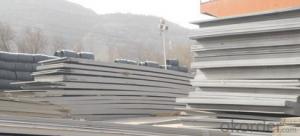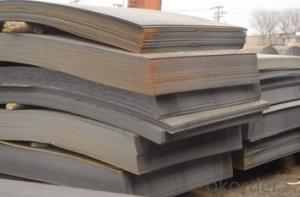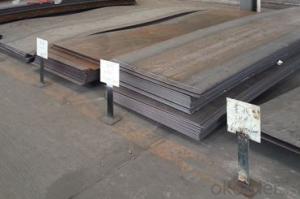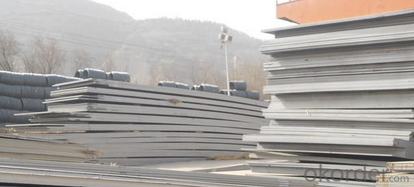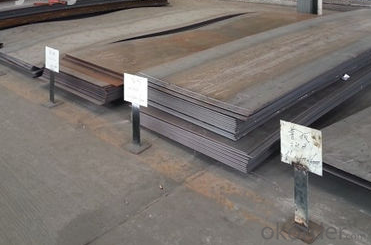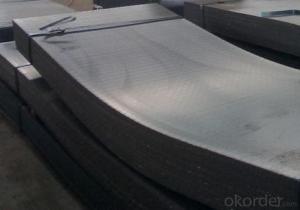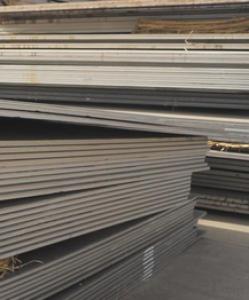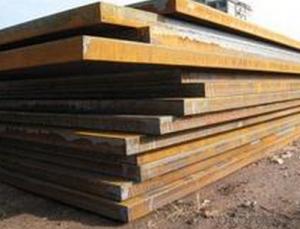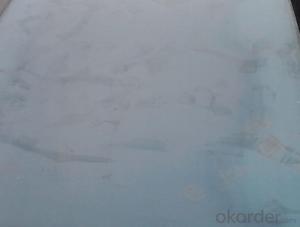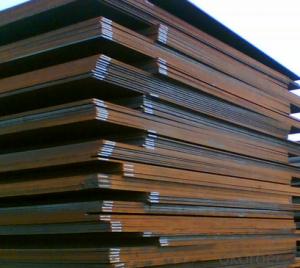Hot Rolled Carbon Steel Plate,Carbon Steel Sheet 19Mng, CNBM
- Loading Port:
- Qingdao
- Payment Terms:
- TT OR LC
- Min Order Qty:
- 10 pc
- Supply Capability:
- 30 pc/month
OKorder Service Pledge
OKorder Financial Service
You Might Also Like
Quick Details
| Standard: | AISI, ASTM, GB, JIS | Grade: | Q195,Q235,Q345,A36,C45 | Thickness: | 1.0-30MM |
| Model Number: | Q235,Q195,Q345 | ||||
| Type: | Steel Plate | Technique: | Hot Rolled | Surface Treatment: | Coated |
| Application: | Ship Plate | Special Use: | Silicon Steel | Width: | 30-2000mm |
| Length: | as your requirement | standard: | hot rolled | Surface: | Anti-rust oil |
Packaging & Delivery
| Packaging Details: | seaworthy packages or as customers' require |
| Delivery Detail: | within 15 days after the advance payment |
Hot rolled steel plate
1 carbon steel plate 3mm thick General information
| Product name | Type | Specification | Implementation of GB | ||
| thick | wide | long | |||
| Carbon structural steel | Q195,Q215, Q235A,Q235B, Q235C,Q255, Q275 | 4-120 | 1500-4500 | 6000-12000 | GB/T700-2006 |
| Low-alloy structural steel | Q295,Q345A, Q345B,Q2345C | 4-120 | 1500-4500 | 6000-12000 | BG/T1591-1994 |
| Quality carbon structural stee | 30-50 | 4-120 | 1500-4500 | 6000-12000 | BG/T699-1999 |
| Ship steel | CCSA,CCSB | 4-120 | 1500-4500 | 6000-12000 | materials and welding condition |
| CCSAH32,CCSAH36 CCSDH32,CCSDH36 | 4-120 | 1500-4500 | 6000-12000 | materials and welding condition or GB 712-2000 | |
| Boiler steel | 20g,22Mng, 16Mng,19Mng | 4-120 | 1500-4500 | 6000-12000 | GB 713-1997 |
| Pressure vessel steel | 1622Mng,20R, 15MnVR,15MnVNR | 4-120 | 1500-2700 | 6000-12000 | GB 6654-1996 |
| European standard plate
| S235JR,S235J0, S275JR,S275J0, S275JR2,S355JR, S355J0,S355J2 | 4-120 | 1500-4500 | 6000-12000 | EN 10025 |
| Japanese standard plate | SS400,SS400-B | 4-120 | 1500-4500 | 6000-12000 | JIS G3101-2004 |
2 carbon steel plate 3mm thick detail specification
Material:
A283Gr.D/A573Gr.65,A516Gr65,A516Gr70,A284Gr.D
SS400,SS300,CCSB A36,A32,LRA32,LRB,Q235
Q195,Q235,Q345,SS400,ASTM A36,E235B
Thickness: 4mm-120mm
width: 1500mm-4500mm
Length:2-10m ,accordingly
Thickness | 4-120mm |
Width | 1500-4500mm or as custom's request |
Length | 2-12m,as your requirment |
Technique | Cold rolled or hot rolled |
Surface treatment | Bare, galvanized coated or as customer's requirements. |
Standard | ASTM,EN,GB,JIS,GB |
Material | A283Gr.D/A573Gr.65,A516Gr65,A516Gr70,A284Gr.D SS400,SS300,CCSB A36,A32,LRA32,LRB,Q235 Q195,Q235,Q345,SS400,ASTM A36,E235B |
Terms of Payment | L/C or T/T |
Chemical composition | C≤0.004%;Si≤0.030%; Mn ≤0.17%;P≤0.012%; S≤0.010%; Fe balance |
Delivery Detail | within 30days once receive deposite or confirm L/C |
Packing | Standard export packing,or as requirement |
3 carbon steel plate 3mm thick application:
construction,machinery manufacturing, container manufacturing, shipbuilding, bridge construction. Can also be used to manufacture a variety of containers, the furnace shell, furnace plate, bridge and vehicle static steel plate, low alloy steel plate,shipbuilding plate, boiler plate, pressure vessel plate, pattern plate, tractor parts, automobile frame steel plate and welding components
- Q: What are the problems encountered in the construction of steel sheet piles? How to deal with
- Steel sheet pile and fill ground segment into the process by the lateral extrusion force of different rocks are prone to deviation, take the following measures to rectify the deviation in the deflection position of the steel sheet pile to pull l.0m ~ 2.0m, and then down into the hammer, so the up and down reciprocating vibration extracting several times, can make the big stone shattered or the displacement, make steel sheet pile position is correct, reduce the inclination of the steel sheet pile.
- Q: What is the minimum thickness of steel sheets?
- The minimum thickness of steel sheets can vary depending on the specific application and industry requirements. However, it generally ranges from around 0.4 millimeters to 6 millimeters.
- Q: Are steel sheets suitable for sports stadiums or arenas?
- Yes, steel sheets are suitable for sports stadiums or arenas. Steel is known for its strength and durability, making it an ideal material for supporting large structures like stadiums. It can provide the necessary structural integrity, withstand heavy loads, and resist extreme weather conditions. Additionally, steel sheets can be easily fabricated and customized to meet the specific design requirements of sports stadiums or arenas.
- Q: Can steel sheets be used for storage racks or shelves?
- Yes, steel sheets can be used for storage racks or shelves. Steel is a durable and strong material, making it ideal for heavy-duty storage applications. Steel sheets can be fabricated into various shapes and sizes to create storage racks or shelves that can hold heavy items and withstand the weight over time. Additionally, steel is resistant to corrosion, ensuring the longevity and reliability of the storage solution. Steel sheets can be easily cleaned and maintained, making them suitable for storing a wide range of items, including tools, equipment, and products in industrial, commercial, or residential settings.
- Q: What is the thickness tolerance for steel sheets?
- The thickness tolerance for steel sheets can vary depending on the specific grade of steel and the manufacturing process. In general, the industry standard for steel sheet thickness tolerance is typically ±0.005 inches (0.13 mm). However, it is important to note that different applications and industries may have their own specific tolerance requirements. Therefore, it is essential to consult the relevant standards and specifications for the specific steel sheet being used to determine the appropriate thickness tolerance. Additionally, some manufacturers may offer tighter tolerances based on customer requirements or specialized applications.
- Q: What are the different certification standards for steel sheets?
- There are various certification standards for steel sheets, including ISO 9001 which ensures quality management systems, ISO 14001 which focuses on environmental management systems, and ASTM A568/A568M which specifies the general requirements for steel sheet products. Additionally, there are standards such as ASTM A653/A653M for hot-dip galvanized steel sheets and ASTM A1008/A1008M for cold-rolled steel sheets. These standards help ensure the quality, performance, and compliance of steel sheets in different applications.
- Q: Do steel sheets require any special storage or handling?
- Special storage and handling are required for steel sheets. To prevent corrosion and damage, it is crucial to store them in a dry and well-ventilated area, avoiding moisture buildup. Additionally, they should be kept away from direct sunlight and extreme temperature fluctuations to prevent warping or cracking. To prevent bending or sagging, steel sheets should be stored horizontally on a flat surface. Furthermore, it is advisable to stack them securely and appropriately, utilizing suitable supports or pallets, to prevent accidents or injuries. When handling steel sheets, proper lifting equipment and techniques should be employed to avoid injuries and sheet damage. Wearing gloves is essential to protect against sharp edges, and caution should be exercised to prevent contact with materials that may cause scratches or damage. Adhering to these storage and handling guidelines will ensure the durability and quality of steel sheets.
- Q: Steel plate pile length, adjacent two steel plate pile joints should be staggered what position?
- Hello, due to site transportation restrictions and insufficient length of existing materials and other reasonsSome projects need to meet the design length by using the site connection method.
- Q: What are the different sheet metal cutting techniques for steel sheets?
- There are several different sheet metal cutting techniques that can be used for steel sheets. Some of the most common methods include shearing, laser cutting, plasma cutting, and waterjet cutting. Shearing involves the use of a mechanical shear to cut the steel sheet along a straight line. Laser cutting uses a high-powered laser beam to melt and vaporize the steel, creating a precise and clean cut. Plasma cutting utilizes a plasma torch to heat and melt the steel, while a high-velocity jet of ionized gas blows the molten metal away. Waterjet cutting involves the use of a high-pressure stream of water mixed with abrasive particles to erode and cut through the steel sheet. Each technique has its own advantages and limitations, depending on factors such as the thickness of the steel, desired precision, and cost considerations.
- Q: Can the steel surface be made of epoxy resin flooring?
- According to the characteristics of epoxy resin, it should be possible
Send your message to us
Hot Rolled Carbon Steel Plate,Carbon Steel Sheet 19Mng, CNBM
- Loading Port:
- Qingdao
- Payment Terms:
- TT OR LC
- Min Order Qty:
- 10 pc
- Supply Capability:
- 30 pc/month
OKorder Service Pledge
OKorder Financial Service
Similar products
Hot products
Hot Searches
Related keywords
